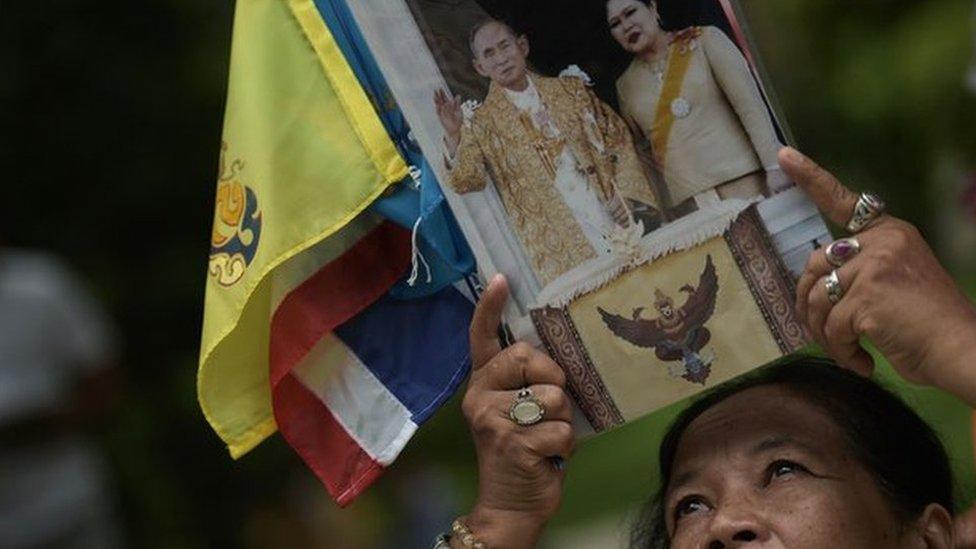Thai protesters confront royals in Bangkok visit
- Published
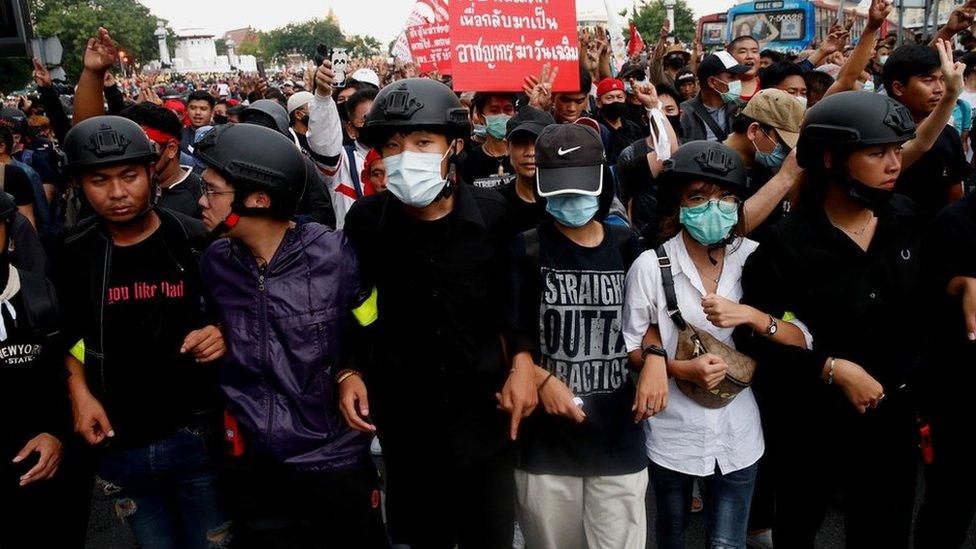
Thousands gathered to protest in Bangkok on Wednesday, some forming human chains
Pro-democracy protesters in Thailand have confronted a motorcade carrying members of the royal family as it passed through a rally in Bangkok.
The protesters, who were pushed back by ranks of police, raised the three-finger salute that has become a symbol of the protest movement.
They have called for curbs on the king's powers and for the resignation of Prime Minister Prayuth Chan-ocha.
The protests on Wednesday follow months of escalating tension in the country.
The BBC's Jonathan Head says the Thai government has its back against the wall
The peaceful confrontation happened on Wednesday evening as Queen Suthida was travelling in a motorcade on the streets of Bangkok after attending a Buddhist ceremony at the Grand Palace.
As her car passed by, a crowd of protesters chanted and raised their hands in the three-finger salute. The gesture is thought to have been inspired by the Hunger Games films in which it is used as a symbol of unity and defiance.
Earlier in the afternoon, the king and queen had travelled together without incident to the Grand Palace along Ratchadamnoen Avenue, where demonstrations had took place earlier in the day. Most of the protesters had moved out of the site by the time their motorcade went past, leaving royalists along the route.
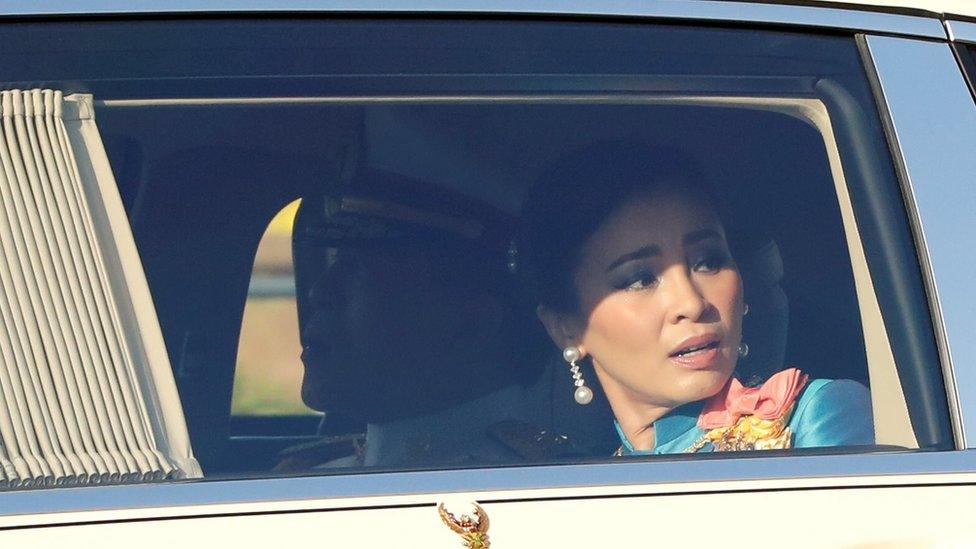
The king and queen had travelled together without incident to the Grand Palace earlier on Wednesday
Supporters of the monarchy, dressed in t-shirts in royal yellow colour, staged rival protests in the capital, with some filmed violently attacking the pro-democracy protesters. Some witnesses accused the government of disguising police as royalist demonstrators.
The two sides had gathered separately along Ratchadamnoen Avenue on Wednesday afternoon and were kept largely apart by police. The anti-government protesters linked arms and marched chanting "Prayuth, get out!" - referring to the prime minister - and "Long live the people!"
The protesters were prevented from reaching Government House by what appeared to be ranks of royalist supporters wearing yellow t-shirts who linked arms and shouted insults at the protesters.
"We want to show that we love the king," 47-year-old Sirilak Kasemsawat told AFP news agency, accusing the pro-democracy movement of wanting to "overthrow" the monarchy - a charge the movement has always denied.
"We're not asking them to be toppled, forgotten, or not to be respected," said Dear Thatcha, a pro-democracy protester. "We're just asking them to change with us. Our country needs to adapt to many things, and the monarchy is one of the issues that needs to be adapted as well," she said.
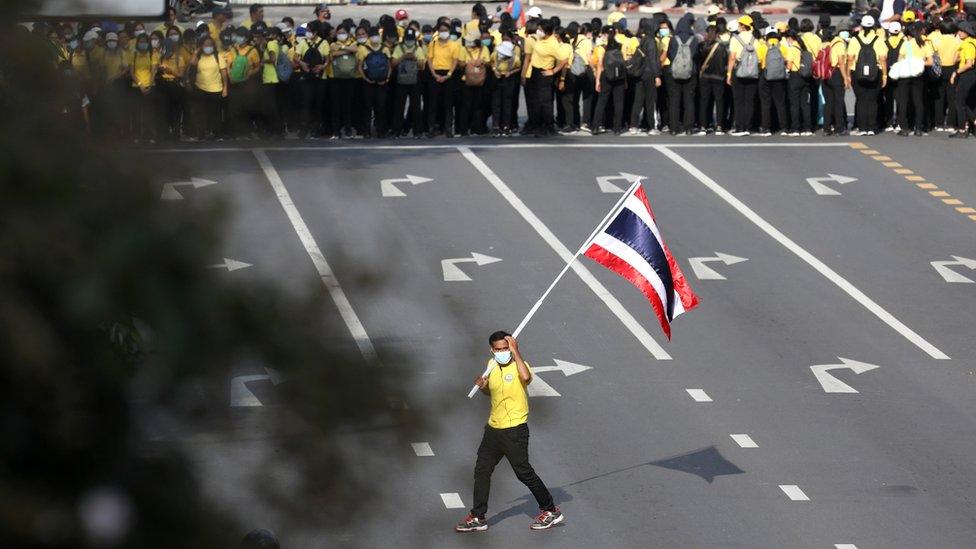
Royalists in yellow t-shirts staged rival protests
The growing student-led protest movement, which began in July, has become the greatest challenge in years to Thailand's ruling establishment. Protests over the weekend in the capital were some of the largest in years, with thousands defying authorities to gather and demand change.
Authorities say 18,000 people joined Saturday's demonstration, although others gave higher figures. Many stayed to continue the protest into Sunday before dispersing.
The protesters' calls for royal reform are particularly sensitive in Thailand, where criticism of the monarchy is punishable by long prison sentences.

Ratchadamnoen Avenue - literally the King's Walk - has been the scene of many of Thailand's political battles. This afternoon, the student-led anti-government movement managed to occupy Democracy Monument, the Art Deco sculpture which symbolises the end of the absolute monarchy 88 years ago.
But this time large numbers of royalist demonstrators in yellow t-shirts lined the boulevard, with members of the security forces conspicuous among them. For the first time since these protests began in July, King Vajiralongkorn is in Bangkok at the same time, and his motorcade was due to travel down Ratchadamnoen.
The potential for violence was real; police sources said they were at their highest threat level. A few flowerpots were thrown in some brief skirmishes around the monument, but for the most part both sides showed great restraint, and the anti-government side was allowed to march unchallenged.
They chanted reformist mantras and revolutionary slogans on their way to the office of the prime minister - by now thoroughly barricaded by concrete and razor wire - and the risk of a clash and a royal embarrassment was averted.
But the demands of younger protesters in particular, that the monarchy be made accountable to elected institutions, are undiluted, and expressed with breath-taking frankness when you consider the price paid by royal critics in the past. This constitution, like all its predecessors, states at the top that the king must be held in a position of revered worship.
These protesters are adamant this must change, that such a wealthy, powerful and expensive institution must be accountable. The government is equally adamant that the monarchy cannot be discussed. At some point, something will have to crack.

Why are there protests?
Thailand has a long history of political unrest and protest, but a new wave began in February after a court ordered a fledgling pro-democracy opposition party to dissolve.
The Future Forward Party (FFP) had proved particularly popular with young, first-time voters and garnered the third-largest share of parliamentary seats in the March 2019 election, which was won by the incumbent military leadership.
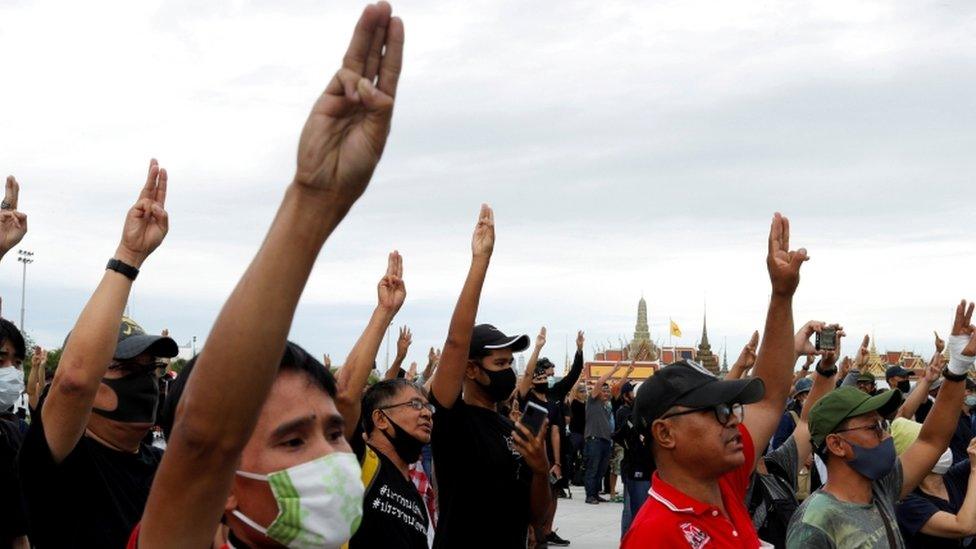
Protesters were on the streets of Bangkok again on Sunday
Protests were re-energised in June when prominent pro-democracy activist Wanchalearm Satsaksit went missing in Cambodia, where he had been in exile since the 2014 military coup.
His whereabouts remain unknown and protesters accuse the Thai state of orchestrating his kidnapping - something the police and government have denied. Since July there have been regular student-led street protests.
Demonstrators have demanded that the government headed by Prime Minister Prayuth, a former army chief who seized power in the coup, be dissolved; that the constitution be rewritten; that the authorities stop harassing critics.
- Published17 September 2020
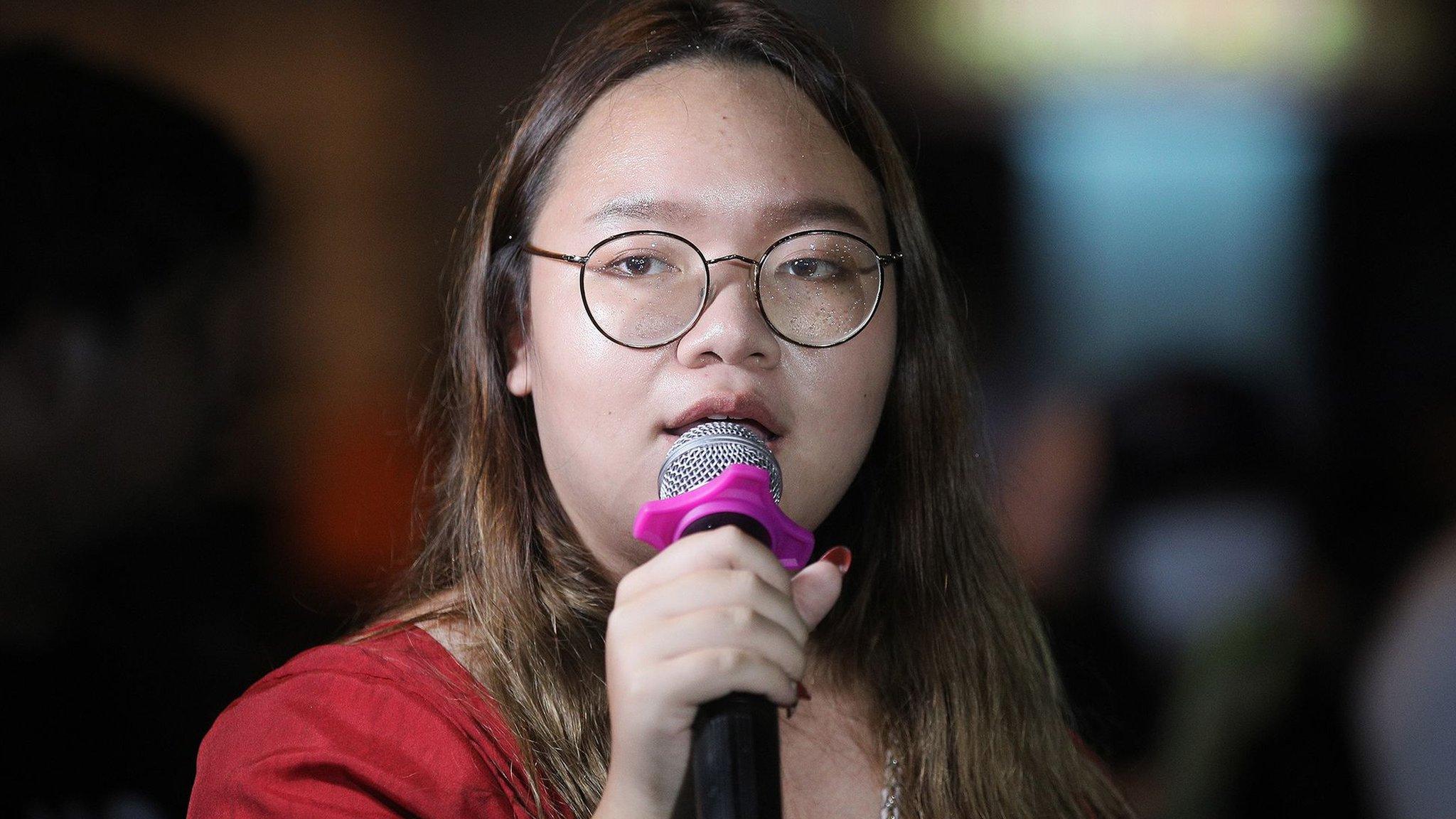
- Published1 August 2020
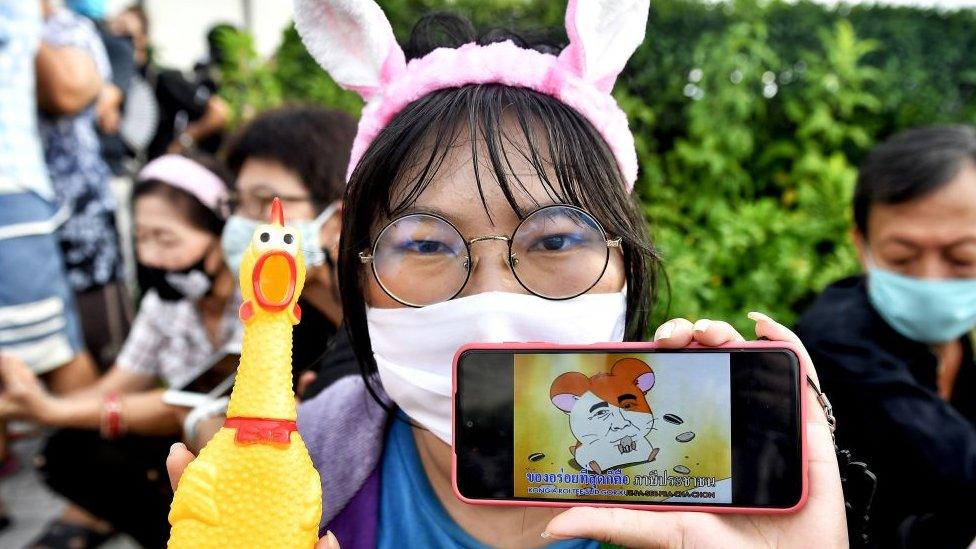
- Published2 July 2020
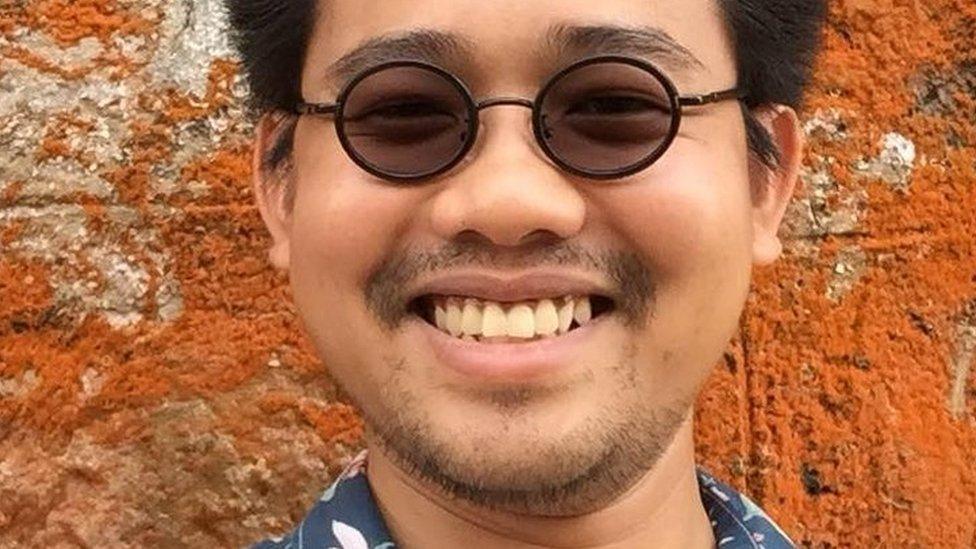
- Published6 October 2017
